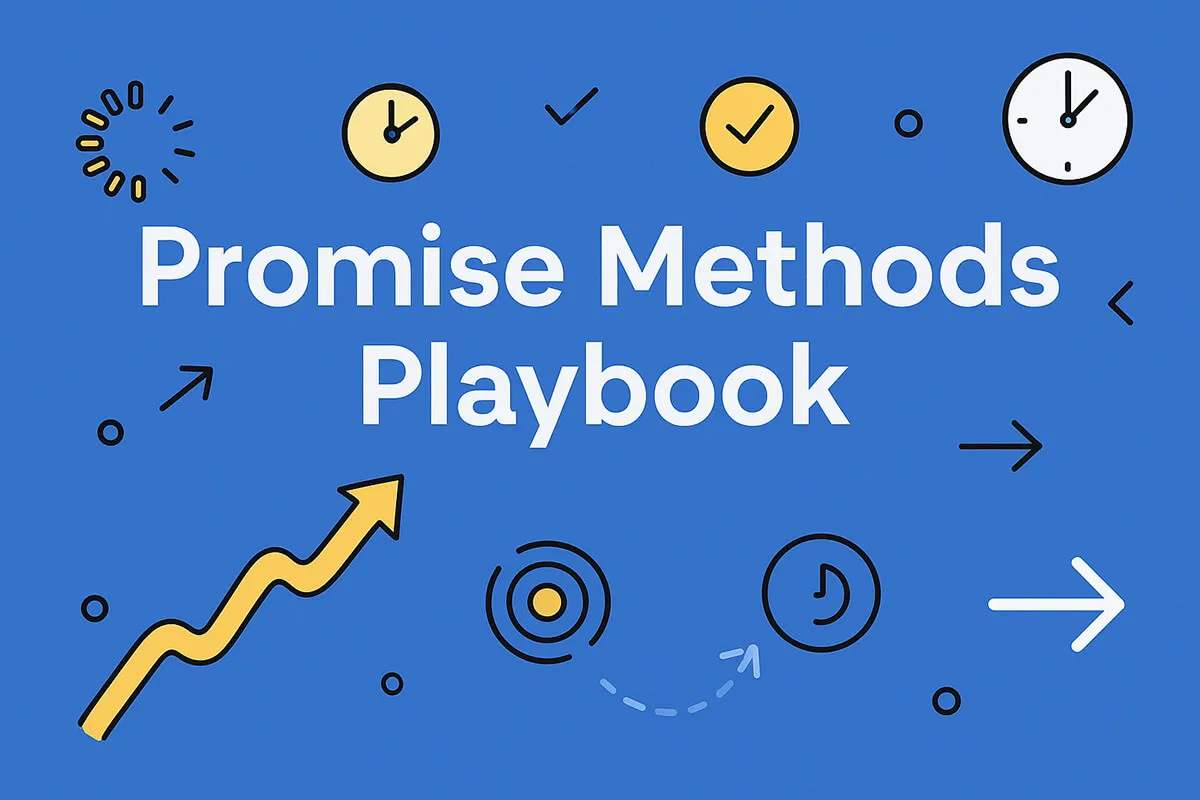Promise Methods Playbook
A fun, practical guide to JavaScript promise methods — all, allSettled, race, any, resolve/reject, and finally — with examples you'll actually use.

Promise Methods Playbook
“Async without a plan is just waiting with extra steps.”
Modern applications often juggle multiple async tasks: fetching resources, uploading files, coordinating services. Promise methods help you orchestrate that work clearly and predictably. Here’s a practical tour with examples and when to use each one.
Promise.all() — Wait for everything or fail fast
Resolves when all promises succeed, rejects immediately if any fail.
const userReq = fetch('/api/user');
const postsReq = fetch('/api/posts');
const commentsReq = fetch('/api/comments');
Promise.all([userReq, postsReq, commentsReq])
.then(async ([u, p, c]) => {
const [user, posts, comments] = await Promise.all([u.json(), p.json(), c.json()]);
console.log({ user, posts, comments });
})
.catch((err) => {
console.error('Something went wrong:', err);
});Use it for: scenarios where all data is required (e.g., rendering a dashboard).
Promise.allSettled() — Get a full report
Waits for all promises, regardless of success or failure. Returns { status, value | reason } for each.
const uploads = [uploadFile(fileA), uploadFile(fileB), uploadFile(fileC)];
const results = await Promise.allSettled(uploads);
results.forEach((result) => {
if (result.status === 'fulfilled') {
console.log('Uploaded:', result.value);
} else {
console.warn('Failed:', result.reason);
}
});Use it for: bulk operations where partial success is acceptable (emails, file uploads, notifications).
Promise.race() — First to settle wins
Settles as soon as the first promise resolves or rejects. Handy for enforcing timeouts.
function withTimeout(promise, ms) {
const timeout = new Promise((_, reject) =>
setTimeout(() => reject(new Error('Timeout exceeded')), ms)
);
return Promise.race([promise, timeout]);
}
try {
const response = await withTimeout(fetch('/api/slow'), 2000);
const data = await response.json();
console.log(data);
} catch (err) {
console.error(err.message);
}Use it for: deadline enforcement, e.g., API requests that must complete within 2s.
Promise.any() — First success wins
Resolves as soon as one promise fulfills. Ignores rejections, fails only if all fail.
const mirrors = [
fetch('https://cdn1.example.com/data'),
fetch('https://cdn2.example.com/data'),
fetch('https://cdn3.example.com/data'),
];
try {
const fastest = await Promise.any(mirrors);
const data = await fastest.json();
console.log('Loaded from:', fastest.url);
} catch (err) {
console.error('All sources failed:', err);
}Use it for: high-availability strategies (multiple servers, CDNs, fallback APIs).
Promise.resolve() / Promise.reject() — Instant promises
Creates a promise that is immediately resolved or rejected.
const value = await Promise.resolve(42);
console.log(value); // 42
Promise.reject(new Error('Boom')).catch((err) => console.error('Caught:', err.message));Use it for: wrapping synchronous values in async flows, testing async functions, or mocking APIs.
.finally() — Always clean up
Runs whether the promise resolves or rejects.
setLoading(true);
fetch('/api/data')
.then((res) => res.json())
.then((data) => useData(data))
.catch((err) => showError(err))
.finally(() => setLoading(false));Use it for: hiding loaders, closing DB connections, or releasing locks.
Quick Cheatsheet
- all → wait for everything; fail fast on one error
- allSettled → get all results, success or failure
- race → first settled wins (use with timeouts)
- any → first successful wins (fault tolerant)
- resolve/reject → create promises instantly
- finally → cleanup runs regardless
References
Async gets easier when you pick the right method for the job. Keep this playbook handy, and let the runtime do the heavy lifting. 🚀